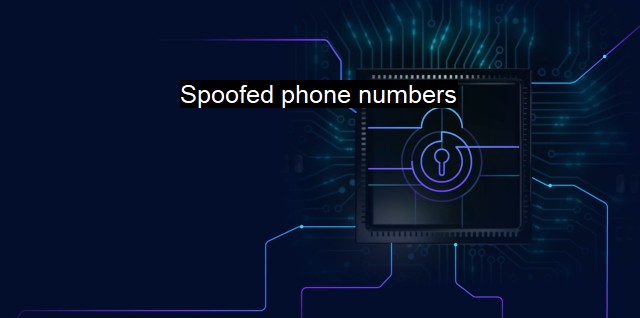What are Spoofed phone numbers?
The Perils of Spoofed Phone Numbers in Cybersecurity: How Cybercriminals Are Exploiting Vulnerabilities for Financial Gain
With "spoofed phone numbers" are becoming an increasingly prevalent concern. a spoofed phone number is one that has been altered or masked to appear as though it is coming from somewhere else; typically an entity or person other than the actual source. This deceitful practice is often employed by cybercriminals to trick individuals into sharing personal or financial information, or entice them to act in a manner that is potentially harmful or detrimental.To gain a deeper understanding, let's further delve into the nitty-gritty of this process. Phone number spoofing is essentially a modern byproduct of Caller-ID which was introduced in the late 1980s to help individuals identify numbers of known copious callers. Sadly, the benefits of this beneficial tool are now being manipulated by scammers to conceal their real identities. By using readily available software and technology, fraudsters alter the phone number that appears on the recipient's Caller ID. This "spoofed" number is often designed to look like a familiar, local, or trusted number, increasing the likelihood that the recipient will answer the call.
Looking at the context of cybersecurity, spoofed phone numbers serve as a guise for various types of scams. Phishing, for instance, is one of the most common scams carried out via spoofing. The scammer, disguising their number, calls posing as a representative from a legitimate company such as a bank or electricity utility. They then trick the victim into sharing sensitive information such as Social Security numbers, banking details, or passwords. Spoofed numbers can also be used to execute identity theft, illegal telemarketing, or even to propagate rumors or spread disinformation.
In the sphere of antivirus, spoofed phone numbers can play a pivotal role in distributing malware. Cybercriminals can leverage spoofed numbers to convince victims to install rogue software, often disguised as a critical update or essential antivirus software. Once installed, this software can infiltrate the user’s device, compromising personal information, or introducing harmful viruses. In a more damaging scenario, ransomware can be deployed, encrypting the victim’s valuable data, then hackers use the panic situation demanding a ransom to decrypt the data.
Although organizations, as well as authorities, are proactive in implementing measures to prevent phone spoofing, its dynamical aspect makes it a tough challenge. Robocall-blocking apps, for one, have been designed to block calls from known scam sources. Various organizations maintain databases of confirmed spam numbers and these databases are referenced by these apps to filter potential spoofed numbers. these preventive measures aren't foolproof due to the evolving nature of telephone spoofing technology.
Education surrounding spoofed numbers has become paramount. Informing and alerting individuals about these cyber threats will increase the general awareness, ensuring fewer people fall victim to such scams. Basic tips not to share sensitive information over unverified calls or to hang up and call back using a trusted number, can go a long way in combating this burgeoning menace.
Spoofed phone numbers pose a significant cybersecurity threat, enabling a range of cybercrimes from phishing to distributing malware. Both individuals and organizations must be proactive in understanding this threat, applying preventive measures, and educating themselves about spotting and dealing with potential phone spoofing attempts. As technology continues to advance, so does the ability of cybercriminals to exploit it. Therefore, the need for comprehensive and bullet-proof cybersecurity and antivirus measures has never been more critical than it is today.

Spoofed phone numbers FAQs
What is a spoofed phone number?
A spoofed phone number is a type of scam where the fraudster disguises their caller ID to appear as if the call is coming from a familiar or trusted source. By doing this, the scammer can trick you into giving them sensitive information or money.How can I protect myself from spoofed phone numbers?
You can protect yourself from spoofed phone numbers by being cautious of unknown phone numbers, avoiding sharing personal information over the phone, and using a spam call blocker or caller ID app to screen your calls.Can antivirus software protect me from spoofed phone numbers?
Antivirus software is designed to protect your computer or mobile device from malware threats, not spoofed phone numbers. However, some antivirus software may include features that help identify and block spam calls.What should I do if I receive a call from a spoofed phone number?
If you receive a call from a spoofed phone number, do not provide any personal information and hang up immediately. You can also report the incident to your phone carrier, the Federal Trade Commission, or local law enforcement agencies.| | A | | | B | | | C | | | D | | | E | | | F | | | G | | | H | | | I | | | J | | | K | | | L | | | M | |
| | N | | | O | | | P | | | Q | | | R | | | S | | | T | | | U | | | V | | | W | | | X | | | Y | | | Z | |
| | 1 | | | 2 | | | 3 | | | 4 | | | 7 | | | 8 | | |||||||